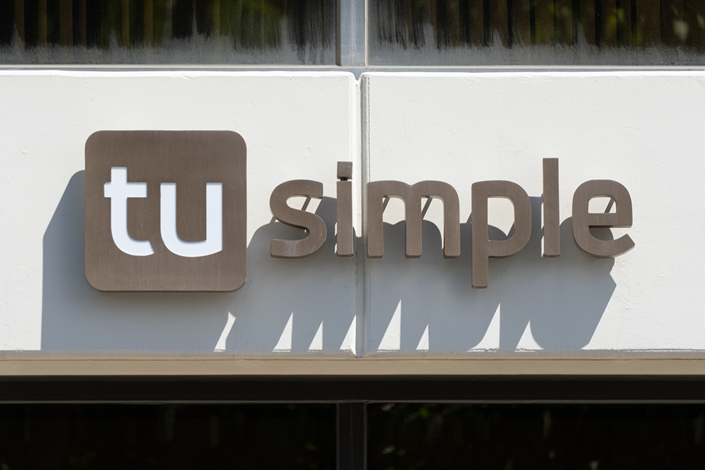
Welcome to Caixin’s Tech Insider, your twice-weekly wrap on the movers, shakers and deal-makers in China’s tech scene.
Xiaomi President to step down later this month
Wang Xiang will step down as Xiaomi Corp. president on Dec. 30, the company’s co-founder and Chairman Lei Jun said Thursday in a letter to employees, the latest leadership reshuffle by the smartphone giant that is betting big on electric vehicles.
Wang’s successor will be Lu Weibing, who joined Xiaomi to lead the Redmi subbrand in 2019, according to the notice. Lu’s authority has expanded in recent years, adding roles as president of the China region and head of the international department, according to Xiaomi’s website.
Earlier this month, Xiaomi’s chief business officer in India, Raghu Reddy, left the company amid intensifying regulatory scrutiny and competitive pressure.
TuSimple plans to offload 25% of its workforce
TuSimple Holdings Inc. announced plans Wednesday to cut its workforce by 25%, a move the Nasdaq-listed autonomous truck startup said would help save as much as $65 million per year in costs amid efforts to improve its capital efficiency.
After the layoffs, which will affect 350 workers, TuSimple’s headcount will fall to around 1,100, about 80% of whom will focus on research and development, the company said.
TuSimple also said it will shift focus to offering self-driving technology and solutions to partners in transportation businesses.
Nio falls victim to blackmail by hackers
Chinese electric carmaker Nio Inc. said Tuesday it is being blackmailed by hackers who had stolen its user and car-sales data and are demanding $2.25 million in bitcoin in return for not releasing the information.
“The company strongly condemns such unlawful acts and will not bow down to cybercrimes,” Nio said in a statement, pledging to take responsibility for any potential damage to customers.
An internal probe revealed that part of Nio’s user and vehicle-sales information prior to August 2021 was compromised.
Huawei-backed EV-maker launches urban navigation system
Arcfox, a premium brand owned by Beijing-based electric-vehicle (EV) company BAIC BluePark New Energy Technology Co. Ltd., said Monday it had launched a driver assistance function for use in Shanghai in cars it is co-developing with Huawei Technologies Co. Ltd.
The new feature — called Navigation Cruise Assist — has been incorporated into Alpha S models that come with Huawei Inside, a system designed to help drivers handle urban traffic situations such as passing cars and changing lanes, Arcfox said.
Xiaomi to slash 10% of headcount amid declining revenue
Xiaomi Corp. is letting go almost 10% of its employees, or as many as 3,500 people, a company source told Caixin on Tuesday, as the smartphone giant steps up efforts to control costs in the face of declining revenue amid weak consumer demand.
Another person at Xiaomi said that all divisions will be affected, but some more than others, and a few business segments will be closed.
Global smartphone sales are set to decline 2.9% next year following a 12.2% slump in 2022, Jefferies analysts predicted this month. Xiaomi’s unit sales will decrease this year and next before recovering slightly in 2024, Jefferies forecast.
Boss Zhipin completes dual listing in Hong Kong
Nasdaq-listed Kanzhun Ltd., the operator of Chinese recruitment app Boss Zhipin, made a dual primary listing on Thursday on the Hong Kong Stock Exchange by way of introduction — a mechanism that does not involve new stock issuance or fundraising.
It becomes the latest U.S.-traded Chinese firm to list closer to home to hedge against the risk of being booted from American bourses due to auditing issues.
The stock opened at HK$77.85 ($9.98) a share before ending the day at HK$78.50.
In the third quarter of this year, Kanzhun logged a net profit of 211.7 million yuan ($29.8 million), representing a year-on-year drop of 26%, and saw a 2.7% decline in revenue to 1.18 billion yuan, according to its earnings report.
Ecarx goes public on Nasdaq via SPAC merger
Hangzhou-based smart car startup Ecarx Holdings Inc., which counts Chinese automaker Geely as a major backer, made its debut on the Nasdaq on Wednesday after its merger with blank-check firm Cova Acquisition Corp., according to a statement.
The deal with the shell firm includes a $45 million investment from Zhejiang Geely Holding Group Co. Ltd., lidar-sensor maker Luminar Technologies Inc. and automotive company Lotus Technology, according to Ecarx.
Founded in 2017, Ecarx develops technologies related to smart cockpits, auto chips, high-definition maps, intelligent driving, big data and the internet of vehicles.
In the first half of 2022, Ecarx logged a net loss of $85.2 million on revenue of $196 million, about 73.6% of which came from deals with customers affiliated with Geely, according to its prospectus.
U.S. Senate passes bill banning TikTok on government devices
The U.S. Senate has passed a proposal to ban federal employees from using ByteDance Ltd.-owned video-sharing app TikTok on government-issued devices in a $1.7 trillion omnibus spending bill.
The bill orders the White House Office of Management and Budget and the General Services Administration to create standards and guidelines for staff at executive agencies to remove TikTok from government-owned devices by mid-February.
Some 19 of the 50 U.S. states have issued directives banning their employees from using TikTok on government-issued devices.
CATL’s first overseas plant starts mass production
Contemporary Amperex Technology Co. Ltd. (CATL), the world’s largest maker of electric-vehicle batteries, said Wednesday that its first overseas factory in the German state of Thuringia had begun mass-producing lithium-ion battery cells on schedule.
Fujian province-based CATL plans to invest 1.8 billion euros ($1.96 billion) in the plant, which has a planned production capacity of 14 gigawatt-hours worth of battery cells, according to a statement.
The German plant is now split into two buildings — one for producing cells and the other for assembling cells into modules, according to CATL.
Tencent launches online drug-sharing platform amid Covid surge
Chinese internet giant Tencent Holdings Ltd. on Tuesday launched a WeChat mini program through which people can share medicine used for treating fever, pain, cold and cough that are in short supply, as demand for Covid drugs surges following an easing of the country’s pandemic control rules.
Users can request certain drugs or share surplus medicines with people in urgent need after registering their ID and phone numbers.
Meanwhile, some brick-and-mortar pharmacies in China have begun providing a limited number of free antipyretic drugs after being told by authorities to boost supplies.
This Caixin Tech Insider was compiled by Ding Yi (yiding@caixin.com) and edited by Michael Bellart (michaelbellart@caixin.com). Send us your tips and feedback.
Get our weekly free Must-Read newsletter.







